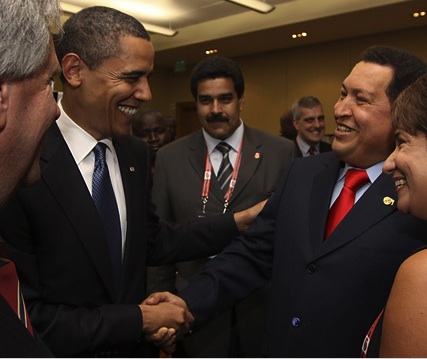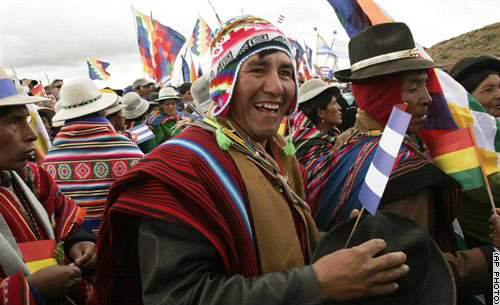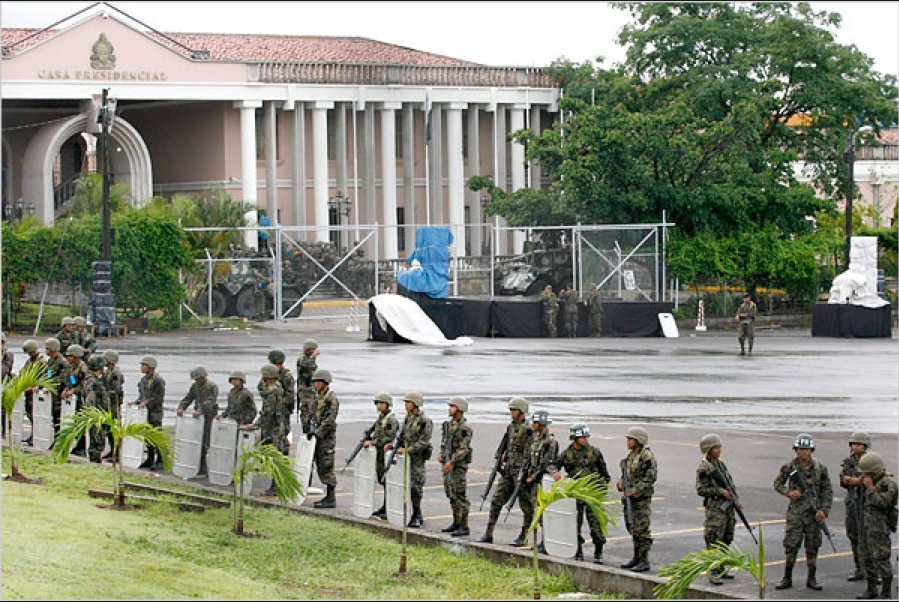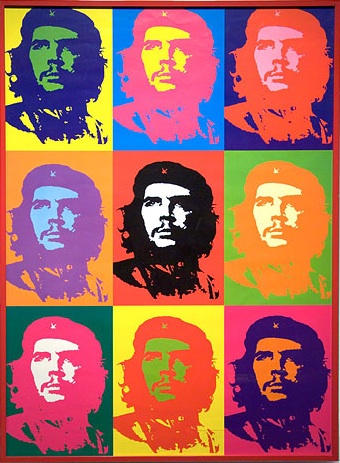Course
Content:
This
course is on the historical & contemporary political economy of
Latin
America. Though the
nations of Latin America
& the Caribbean are richly diverse within and among each
other, they nevertheless
share
in common many
ancient, colonial, and
postcolonial legacy,
and in fact, today they all face similar challenges. A major, still
unifying,
geopolitical
region of the modern world-system since the XVI
Century,
it is a
vibrant region of the world's so-called
South (previously known as the Third World). As such, its history and
contemporary realities have been molded in major ways by its relations
with the world's North - increasingly, since the XIX Century, the
United States. Although
Latin America's elites have mostly been
acquiescent - even enthusiastic partners and allies - of the North's
relentless efforts to protect, sustain and expand a persistently
unbalanced and inequitable global system, Latin
America's popular social revolutions and movements have made
significant contributions to redress these inequities, both within each
country and internationally.
Still,
the neocolonial status of Latin America has been enduring. The latest
cycle of
elite subservience and popular rebellion was manifested in the 1980s,
with the widespread adoption of the
state doctrine and policies that emanated from the North referred to as
"neoliberalism." As a result of the political and economic elites
uniformly embracing that market fundamentalist doctrine, and
implementing over
the
last thirty years the
socially devastating policies derived from it,
Latin America entered the XXI Century as the
world's most unequal region, lagging
ever more
the
North in every measure. This failure
of the so-called
"Washington Consensus," produced by the turn of the century a huge
political backlash in most countries, vastly increased the
international
migration flows to the North, and intensified the spread and scale of
narco-trafficking and narco-violence, among other things.
Latin America's
political regimes have dramatically shifted to the left to recover from
3 decades of lost
ground. Today the region exhibits a tremendous intensity and variety of
social movements and
innovative politics, which
reflect the widespread resistance to all the
now discredited imported models of development and
modernity, and the construction of new paths of social & economic
development.
This
course, therefore, explores the historical
and contemporary political economy of this fascinating region
of the modern world-system. We do so from two
interrelated
angles of vision: Firstly, using the Livingstone book, we trace the
social, economic, and political historical evolution of the region
- in relation to the life span of United States global hegemony, since
the early 1800s; and secondly, using the Dollars
&
Sense/NACLA anthology
of articles, we examine the contemporary social, economic, political,
and cultural situation of Latin America at the social movements' level,
as
Latin
Americans of all backgrounds resist further peripheralization of their
countries, seek enduring social justice, and are
working to remake their societies in their own, more equitable ways -
in relation to the precipitous decline of US hegemony, the collapse of
the world economy, and the resurgence of the world's South.
Course
Structure:
Class Presentations, Midterm Exam: The
course relies on the active involvement
of students in their own process of learning. Class
attendance is therefore mandatory (tardiness, early leaving, and
unexcused
absences
will be
penalized); more importantly, students will be expected to come to
class fully prepared to discuss their reading assignments, and will be
randomly quizzed by Dr. Santos to assess their preparedness.
During the first third
of the quarter, Dr. Santos will lecture based on the Livingstone textbook, and all
students should come to
class fully prepared to
discuss
and raise questions regarding each reading assignment.
An essay midterm
exam in
class will be
given on
Thursday, April 29, based
on
that textbook and Dr. Santos'
lectures.
Starting
on May 4th,
and for the remainder of the course, students will make
class presentations, followed by class discussion. Ten groups of mostly
four students will be formed
to that effect. Every session, a group will make their individual
student
presentations on four assigned articles from
the Dollars&Sense/Nacla anthology.
It
is the responsibility of the
groups
to meet beforehand to
plan how they will
divide up the assigned articles. Each
individual student
presentation should last 5-8 minutes. The presentations
must be delivered in PowerPoint format (2 tips: in choosing colors make
sure you can READ the text, and please do not
CLUTTER slides with
too much
text - make
more
slides
instead!). Students should bring their presentations in USB memory
sticks.
Students are
responsible for uploading and pre-testing
their presentations in the classroom
before class starts. Each
individual presentation should critically summarize and assess an
article, highlighting its strong arguments or evidence provided,
selecting appropriate BRIEF quotes to read aloud, and end with a
well-thought-out question
for
discussion. Following
the individual presentations,
there will be class
discussion starting with the questions raised. Of course, all students
are expected to participate with their own prepared
questions and comments - the rule
"no
investigation, no right to speak" will apply for those students
that do not come prepared. Authentic participation - based on
prepardeness - will be rewarded in assessing the final grades.
The individual class presentation
will be
graded based on how well organized,
clean and visually pleasant the presentation is; how well selected
the significant issues or quotes were; the strength of the
critical analysis & the accuracy of all statements made; the personal
communication skills displayed.
Group
Research Project: Each student
group
will select and design a final research project on a
topic related to the course. Each student in a group will write
his/her own paper on a subtopic of the group's topic. The
students must obtain pre approval
from Dr. Santos
for both their overall group
topic and for their
individual
subtopics by Tuesday, May 6. Students may consult with Dr. Santos
during his office
hours - no emails on this, please.
The
subject
matter
and the time frame chosen may be as broad or narrow as each group
wishes, involving all Latin American nations, or a region, or just one
country; it
may cover a time frame of
centuries, a number of decades, or merely the contemporary scene. The
subject
matter may be divided up among the students chronologically,
thematically, or in comparative manner between countries, for example;
but
regardless, the overall research topic
ultimately must be historically
grounded and sociologically
oriented.
Each
student paper should be
between 6 and 8 pages in length (apart from the bibliography),
double-spaced, font 12, with one-inch margins. Students must submit
their individual papers
assembled in a bound volume. The volumes must
have a
title
page, a table of contents listing each individual title and its student
author,
and the actual papers. NOTE: continuous page numbering between papers
and a
single, common
volume bibliography
are unnecessary and
are actually discouraged
(so as to not waste time);
so each
paper should start
with the paper title and author at
the
top, be independently numbered, and have its own bibliography at the
end.
Each individual paper should have a well
stated, well focused
research hypothesis, research topic, or question; a literature
review and a variety of
citations from the scholarly literature consulted; any relevant data
(charts, graphs, maps, etc.) combined with strong critical
analysis; leading to a
conclusion. Papers
will
be graded for clarity of language
and
overall organization; quality of critical analysis;
accuracy and relevance of assembled data.
For guidelines on how to write a good
research term paper, citations
&
bibliographic styles, etc., please go to the following URL: http://www.csub.edu/~gsantos/Guide-Paper.html.
Extra
credit: There are two general studies
courses that
students are strongly
encouraged to take if they wish to develop their research skills, and
if they do will receive extra credit
in this course:
GST
126 - Researching
the Electronic Library
(2 units)
Introduces students to effective
research techniques using Library
electronic resources. Emphasis will be placed upon skills necessary for
the identification, retrieval, and evaluation of information for
general and specific topics. Students will acquire the competencies
necessary to develop an effective search strategy and find research
materials, including references to journal articles, full text articles
in electronic format, government publications, books, and Internet
resources.
GST 153 - Research on the
Internet (2 units)
Introduces students to the
information resources available on the
Internet for research purposes Students will develop general knowledge
of the Internet, navigation skills, effective search strategy skills,
familiarity with Internet finding tools, evaluation methodologies and
other Internet research skills.
Contact: Ms. Christy Gavin
Librarian, Walter W. Stiern Library
cgavin@csub.edu
661-664-3237
Plagiarism:
To
prevent students from wittingly or unwittingly engaging in plagiarism,
Dr. Santos strongly recommends students to carefully read and abide by
the document CSUB
Classifications of Plagiarism found at: http://www.csub.edu/tlc/options/resources/plagiarism/4plagiarimclassifications.htm.
Students should check their papers
at TurnItIn.com, to avoid
making mistakes of plagiarism. Anyone found guilty of engaging in
plagiarism - inadvertently of otherwise - will automatically fail the
course and may be reported to
the Office of Student Discipline and Judicial Affairs for further
disciplinary action.
Grading: The midterm exam will count for 35 points. The
class presentation will count for up to 20 points. The research term
paper will count for 35 points. Class preparedness, active
participation and
perfect attendance (with up to two excused absences) will
count for up to 10 points. Extra
credit for passing either of the general studies course is 3 points per
course. Other extra credit for attending special events may accrue.
Unexcused absences, tardiness, and leaving early will take out points
from the final grade. The
final
letter grade
will be assigned, on a
scale
of 0 to 100, as follows:
| 94-100 = A |
87-89 = B+ |
77-79 = C+ |
65-69 = D |
| 90-93 = A- |
84-86 = B |
74-76 = C |
< 65 = F |
|
80-83 = B- |
70-73 = C- |
|
Office Hours & E-Mail to
Dr.
Santos: All
students are
encouraged to
visit
(or if you can't visit, call) Dr. Santos regularly during his posted
office hours, especially
to
ensure
their research paper topics are
well chosen and organized, or to discuss anything related to their
presentations, the textbooks, the class lectures, or the class
discussions. Private - but brief
and to the
point
- e-mail messages may be sent to Dr. Santos (NOT a substitute for
office visits or calls,
please) and if you do, expect a single-line answer.

Schedule of
Assigned
Readings
Week
|
Tuesday
|
Thursday |
|
1
March 30,
April 1
|
INTRODUCTION
|
Livingstone:
1. Introductory Overview of Isolation American Relations |
|
2
April
6, 8
|
Livingstone:
2. The Monroe Doctrine to Second World War 1823-1945
|
Livingstone:
3. The Cold War: the Guatemalan coup and the Cuban Revolution 1945-1961
4. Alliance for Progress
|
|
3
April
13, 15 |
Livingstone:
5.The Military Governments of the 1970s
6. Reagan and the Central American Tragedy 1979-1989 |
Livingstone:
7. The end of the Cold War: Bush to Clinton 1989-2001
|
|
4
April
20, 22
|
Livingstone:
8. George Bush and the War on Terror |
Livingstone:
9. Why US Drugs Policy Doesn't Work
10. The Economy: Money, Multinationals and Misery
|
|
5
April
27, 29
|
Livingstone:
11. Culture: Coca-Coca, Cartoons and Caricatures
12. Postscript
|
MID-TERM EXAM
|
|
6
May
4, 6
|
Group
1:
Dollars&Sense/Nacla Reader:
Chapter 1: Articles by Rosen, Monreal, Meeks, Kampwirth
|
Group
2:
Dollars&Sense/Nacla Reader:
Chapter 1: Articles by Vernengo, Gustafson
Chapter 2: Articles by Tilly & Kennedy, Baldwin |
|
7
May
11, 13
|
Group
3:
Dollars&Sense/Nacla Reader:
Chapter 2: Articles by Hylton, Robert
Chapter 3: Articles by Cypher, Sciacchitano
|
Group
4:
Dollars&Sense/Nacla Reader:
Chapter 3: Articles by Caliari, Lechini
Chapter 4: Articles by Reuss, Luoma & Gordon |
|
8
May
18, 20
|
Group
5:
Dollars&Sense/Nacla
Reader:
Chapter 4: Articles by Bowman & Stone, Tilly & Kennedy, Bastian
Chapter 5: Article by Bacon |
Group
6:
Dollars&Sense/Nacla
Reader:
Chapter 5: Articles by Stahler-Sholk, Vanden, Monasterios, Babb
|
|
9
May
25, 27
|
Group
7:
Dollars&Sense/Nacla
Reader:
Chapter 5: Article by González-Cruz
Chapter 6: Articles by McFadyen, Tilly & Kennedy, Cervantes |
Group
8:
Dollars&Sense/Nacla
Reader:
Chapter 6: Article by Larsen
Chapter 7: Articles by Barlow & Clarke, Bacon, Witte
|
|
10
June 1, 3
|
Group
9:
Dollars&Sense/Nacla
Reader:
Chapter 7: Article by Cotto
Chapter 8: Articles by Isacson, Brenner & Jimenez, Mondragón
|
Group
10:
Dollars&Sense/Nacla
Reader:
Chapter 8: Article by Enzinna
Web Reading: Obama's
First Year in Latin America
Web Reading: US-Cuba
Relation under Obama
Web Reading: The
Nature of Mexico's Drug Markets
|
|
Research
Papers due in Dr.
Santos's office before noon on Thursday, June 10
|
My
Group #:
______
Date I will present: _____ The article I will present:
.
My Group Research Project Title:
___
__
.
My Own Research Paper Title:
_______
.
My other group members names
Phones
Emails
1.
.
2.
.
3.
.







